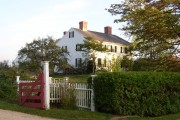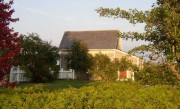Selected works . . .
- The New Yorker Album (1928)
- One Man’s Meat (1942)
- Stuart Little (1945)
- Here is New York (1949)
- Charlotte’s Web (1952)
- The Trumpet of the Swan (1970)
- Letters of E.B. White (1976)
- Essays of E.B. White (1977)
- Poems and Sketches of E.B. White (1981)
- Writings from the New Yorker : 1927-1976 (1990)
(1899-1985) was an author of essays, poetry, and children’s books. Although born in Mount Vernon, New York, Elwynn Brooks White, who spent summers as a child in the Belgrade Lakes region, moved to Brooklin in 1938 with his wife. He lived in an old farmhouse overlooking Blue Hill Bay.
In his essay “Maine Speech,” he explained his adjustment to the language of his new home. Here are some excerpts:
I find that, whether I will or no, my speech is gradually changing to conform to the language of the country. . . . Our boy came home from school the first day and said the school was peachy, but he couldn’t understand what anybody was saying. This lasted only for a couple of days.
For the word “all” you use the phrase “the whole of.” You ask, “Is that the whole of it?” And whole is pronounced hull.
Persons who are not native to this locality are “from away.” We are from away ourselves, and always will be, even if we live here for the rest of our lives. You’ve got to be born here–otherwise you’re from away.
The word dear is pronounced “dee-ah. Yet the word deer is pronounced deer. All children are called dee-ah, by men and women alike. Workmen often call each other dee-ah while on the job.
As a young man, he began writing for the New Yorker magazine in 1925. Virtually every high school English students used his Elements of Style, co-authored with William Strunk, Jr. His children’s books and many of his essays drew on his experiences with his neighbors in Brooklin.
White described life in the Brooklin, Maine house in a 1958 New Yorker article: “It’s been fifteen years since we last wintered in this house. Settling in again to live steadily right around the year, as we used to do, has been full of excitement and the sense of our changed condition. (Anybody who is fifteen years older is in a changed condition, no matter what his condition.) There is no schoolboy in the house now to keep the air stirred up. The room he once occupied now contains a television set; we sit there in stupefaction, listening to “April Love” and learning how to set our hair. Other gadgets have crept in, notably an automatic dishwasher in the back kitchen. This popular machine, for which I have not yet received a bill, washes our dishes pretty well, but it also leaves a hot smell of detergent in the wake of its toil, so that when you pass it on your way out to the woodshed the air in the room tickles the inside of your nose.”
Roger Angell, his stepson, an author in his own right, was very close to White. Angell has been senior editor at the New Yorker magazine, and a gifted essayist, author, and baseball writer. The opening lines from “Andy”:
Lately I have been missing my stepfather, Andy White, who keeps excusing himself while he steps out of the room to get something from his study or heads out the back kitchen door, on his way to the barn again. He’ll be right back. I can hear the sound of that gray door—the steps there lead down into the fragrant connecting woodshed—as the lift-latch clicks shut. E. B. White died in 1985—twenty years ago, come October—and by “missing” I don’t mean yearning for him so much as not being able to keep hold of him for a bit of conversation or even a tone of voice.
Additional resources
Angell, Roger. “Andy.” New Yorker. February 14, 2005. http://www.newyorker.com/archive/2005/02/14/050214fa_fact#ixzz29sqfVd6I
Elledge, Scott. E.B. White: A Biography. New York. Norton. c1984.
Fischer, Jeff. et al. Eds. Maine Speaks: An Anthology of Maine Literature. Maine Writers and Publishers Alliance. Brunswick, Maine. 1989.
LaBrie, Aimee. E.B. White. Philadelphia. Chelsea House Publishers. 2004.
Russell, Isabel. Katharine and E.B. White: An Affectionate Memoir. New York. W.W. Norton. 1988.
White, E.B. “Letter from the East: Wormwood, January 30.” The New Yorker. February 22, 1958. pp. 31-35.




